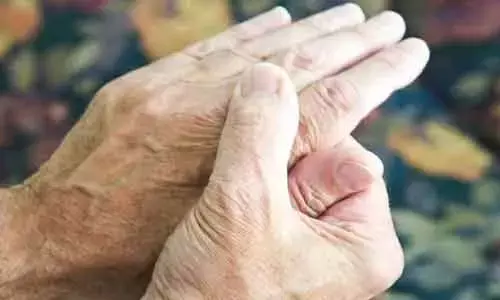- Home
- Medical news & Guidelines
- Anesthesiology
- Cardiology and CTVS
- Critical Care
- Dentistry
- Dermatology
- Diabetes and Endocrinology
- ENT
- Gastroenterology
- Medicine
- Nephrology
- Neurology
- Obstretics-Gynaecology
- Oncology
- Ophthalmology
- Orthopaedics
- Pediatrics-Neonatology
- Psychiatry
- Pulmonology
- Radiology
- Surgery
- Urology
- Laboratory Medicine
- Diet
- Nursing
- Paramedical
- Physiotherapy
- Health news
- Fact Check
- Bone Health Fact Check
- Brain Health Fact Check
- Cancer Related Fact Check
- Child Care Fact Check
- Dental and oral health fact check
- Diabetes and metabolic health fact check
- Diet and Nutrition Fact Check
- Eye and ENT Care Fact Check
- Fitness fact check
- Gut health fact check
- Heart health fact check
- Kidney health fact check
- Medical education fact check
- Men's health fact check
- Respiratory fact check
- Skin and hair care fact check
- Vaccine and Immunization fact check
- Women's health fact check
- AYUSH
- State News
- Andaman and Nicobar Islands
- Andhra Pradesh
- Arunachal Pradesh
- Assam
- Bihar
- Chandigarh
- Chattisgarh
- Dadra and Nagar Haveli
- Daman and Diu
- Delhi
- Goa
- Gujarat
- Haryana
- Himachal Pradesh
- Jammu & Kashmir
- Jharkhand
- Karnataka
- Kerala
- Ladakh
- Lakshadweep
- Madhya Pradesh
- Maharashtra
- Manipur
- Meghalaya
- Mizoram
- Nagaland
- Odisha
- Puducherry
- Punjab
- Rajasthan
- Sikkim
- Tamil Nadu
- Telangana
- Tripura
- Uttar Pradesh
- Uttrakhand
- West Bengal
- Medical Education
- Industry
Favorable balance of benefits and harms of long-term steroid use in RA: GLORIA Trial

Netherlands: Add-on low-dose prednisolone on standard treatment has beneficial long-term effects on damage progression and disease activity in older rheumatoid arthritis (RA) patients, a recent study has claimed. The tradeoff is a 24% increase in patients with mostly mild to moderate adverse events indicating a favorable balance of benefit and harm.
The findings of the study were presented at The European Alliance of Associations for Rheumatology (EULAR) and subsequently published in the BMJ journal Annals of the Rheumatic Diseases.
In rheumatoid arthritis, low-dose glucocorticoid (GC) therapy is used widely but the true balance of benefit and harm is still not known. Considering this, Maarten Boers, Amsterdam UMC, locatie VUmc, Rheumatology; Epidemiology & Data Science, Amsterdam, Netherlands, and colleagues aimed to study the effects of prednisolone (5 mg/day, 2 years) in RA patients aged 65+, requiring adjustment of antirheumatic therapy (DAS28≥2.60) in a pragmatic double-blind placebo-controlled randomized -- GLORIA trial.
The study included 451 RA patients from 7 EU countries. 449 received the intervention; of these 63%, prednisolone vs 61% placebo patients completed 2 years of follow-up.
Harm outcomes were the number of patients with ≥1 serious adverse event (SAE), or ≥1 'other adverse event of special interest' (other AESI). Other AESI comprised any AE (except worsening of RA) causing study discontinuation, and GC-specific events.
Benefit outcomes included joint damage progression (Sharp/van der Heijde) and improvement in disease activity (DAS28).
The findings of the study were as follows:
· Discontinuations were similar in both groups: for AE (14%) and active disease (4%); the remainder mostly for 'trial fatigue' and covid-related access issues (20%).
· Mean time on study drug was 19 (SD 8) months.
· 70% of patients were female, mean age was 72 (max 88) years, RA duration 11 years; 67% were RF+, 56% ACPA+, 96% had joint damage on radiographs: mean score 20, median 8. Mean DAS28 was 4.5.
· Most patients (79%) were on current DMARD treatment, including 14% on biologics; 47% had previously used GC, and 14% changed DMARD therapy at baseline.
· Patients had mean of 2.1 active comorbidities and used median 7 drugs.
· Benefit: Disease activity rapidly declined to stabilize after 1 year, and was lower on prednisolone (adjusted mean difference in DAS28 over 2 years: 0.37).
· The contrast in early (3-month) response was larger in 331 patients adherent to the protocol on stable treatment: the mean difference in DAS28 was 0.62, with more responders on prednisolone.
· Significant time-treatment interaction in secondary analyses suggested a decrease in contrast after the first year, most likely caused by significantly more changes in DMARD treatment on placebo.
· Joint damage progression over 2 years was significantly lower on prednisolone: mean 0.6 (SD 1.9) v 1.8 (6.4) score points on placebo, difference 1.2.
· Harm: 60% prednisolone vs 49% placebo patients experienced the harm outcome: adjusted RR 1.24; number needed to harm 9.5.
· During the study 1 vs 2 patients died, and 3 vs 0 died within 5 months of discontinuation. Per 100 patient years, AE totaled 278 in prednisolone vs 206 in placebo patients, and the difference was most marked for infections; these were mostly mild or moderately severe.
· Other GC-specific AESI was rare without relevant differences.
To conclude, "contrary to guidance from major rheumatology societies, years-long use of corticosteroids in older rheumatoid arthritis patients is both effective and safe."
Reference:
Boers M, Hartman L, Opris-Belinski D on behalf of the GLORIA Trial Consortium, et alOP0263 FAVORABLE BALANCE OF BENEFIT AND HARM OF LONG-TERM, LOW-DOSE PREDNISOLONE ADDED TO STANDARD TREATMENT IN RHEUMATOID ARTHRITIS PATIENTS AGED 65+: THE PRAGMATIC, MULTICENTER, PLACEBO- CONTROLLED GLORIA TRIALAnnals of the Rheumatic Diseases 2022;81:174-175.
Dr Kamal Kant Kohli-MBBS, DTCD- a chest specialist with more than 30 years of practice and a flair for writing clinical articles, Dr Kamal Kant Kohli joined Medical Dialogues as a Chief Editor of Medical News. Besides writing articles, as an editor, he proofreads and verifies all the medical content published on Medical Dialogues including those coming from journals, studies,medical conferences,guidelines etc. Email: drkohli@medicaldialogues.in. Contact no. 011-43720751


